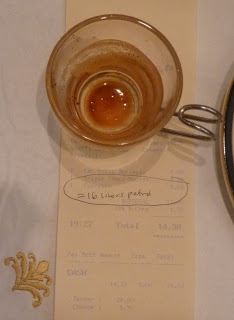

| Visitors Now: | |
| Total Visits: | |
| Total Stories: |

| Story Views | |
| Now: | |
| Last Hour: | |
| Last 24 Hours: | |
| Total: | |
The impacts of cheap energy
Read aguanomics http://www.aguanomics.com/ for the world’s best analysis of the politics and economics of water
Gasoline and diesel are subsidized in Malaysia and Brunei (where you can buy 16 liters — over 4 gallons — of diesel for the same price as an espresso; see photo).
The implications of cheap prices are obvious — people use more fuel — but they manifest in interesting ways.
First, you have the fact that many people sit in their cars, engines running to keep the AC on, reading books, talking or sleeping.
Second, Malay gas stations try to maximize their sales volume, since the government monopoly sells them fuel at a fixed cost (RM 1.73) and also controls sales price (RM 1.80 per liter is EUR0.45/liter or $2.23/gal).
Third, prices do not vary, so people neither shop around for lower prices nor pay attention to how much fuel they use — their price elasticity, in other words, is zero. This makes any attempts to increase prices (a political decision) very controversial, since a change in price is likely to directly reduce income instead of modify quantity demanded.
(I’ll get to cheap hydropower and deforestation after I’ve left Malaysia.)
Bottom Line: Political control of gas prices, in other words, has converted fuel from
a private, economic good into a common pool, political good that is leads to fiscal and energy waste.
2013-01-15 05:37:31
Source: http://www.aguanomics.com/2013/01/the-impacts-of-cheap-energy.html
Source:



